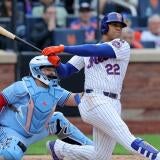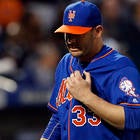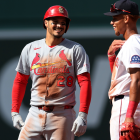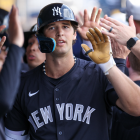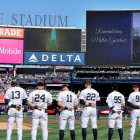It's been quite the ride for Mets starter Matt Harvey for so many reasons.
Remember when he was the darling of the struggling Mets? He got the All-Star Game start in Citi Field in 2013 at age 24. He finished fourth in Cy Young voting that season and looked destined for stardom. Of course, he also needed to undergo Tommy John surgery that year.
After a lost 2014 (again, the surgery), Harvey came back with a very good 2015 campaign, but not one void of drama. Late in the season, it came out that there was an innings limit in place. Because the baseball media/fan world already lost its collective mind over the Stephen Strasburg shutdown, there was enormous media/fan pressure for Harvey to ditch his. He did. He powered through and ended up throwing 189 1/3 regular season innings and tacked on 26 2/3 more in the postseason, culminating with a huge Game 5 performance that would have been (temporarily, as the Royals weren't losing Games 6 and 7) season-saving if manager Terry Collins didn't give in to Harvey's plea to leave him in for the ninth.
Now, and don't think none of this is related (we'll get to that), Harvey is one of the worst starting pitchers in baseball. He's 3-7 with a 6.08 ERA, 1.69 WHIP and is under fire for leaving before answering questions from local media after his flop of an outing earlier this week against the first-place Nationals.
For this, he's been predictably crucified by the New York media. A sampling of headlines:
"Silent Matt Harvey confirms he's the phony Mets have enabled"
"Matt Harvey can't take or throw the heat"
"Matt Harvey Silent Knight act leaves Mets teammates flat, like his fastball"
There are more, but we get the idea.
First off, let me just say I'm a big accountability guy and players should answer questions from the media. It's part of the job -- a job that pays seven figures to play a game, by the way. That shouldn't be taken for granted. Finish the job by answering questions.
Here's David Wright on the matter, via nypost.com:
"Obviously, Harvey is going through a rough stretch, I think we've all been there," Wright told The Post after the Mets beat the Nationals 2-0. "With that being said, I think the consensus is we should all be accountable for what we do on the baseball field.
"All of us like coming in here and talking when we have good games and a few of us, myself included, enjoy coming in here and talking when we don't play well. Accountability is big and I think [Harvey] just had a bit of a lapse in judgment."
That's it. It was poor judgment. There's no reason to go crazy like nearly every New York outlet did (see above) when it's simply a case of a guy leaving too early when he shouldn't have. In fact, let's take a look at all the reasons why this explosion was a complete overreaction.
1. The "can't take the heat" nonsense
This is a suggestion that Matt Harvey is scared to answer questions from the media. This is a man who was nails for eight innings in a game the Mets had to win or go home in the World Series. He shut down a then-scorching hot Cubs team in Game 1 of the NLCS. He started an All-Star Game in New York. But he's scared of a bunch of reporters asking questions like, "hey, what was wrong out there tonight?"
2. He's been answering these questions
What more is there to even say at this point? He's continually given vanilla answers about how he feels fine and wants to keep working hard on improving. That's it. It's boring. It adds nothing to the game story.
3. This same media pressured him to keep going last year
See the introduction above. Harvey barrelled through his innings limit due at least in part to media -- and, in turn, fan -- pressure. There's a reason for those limits. They aren't just made up for fun.
Take note of Harvey's velocity. Last July, his fastball averaged 96.85 miles per hour (Brooks Baseball). This May it's 94.82. Two miles per hour is a significant dip.
Also, look at Harvey's success the first time through the order versus past that. Here's what opposing hitters have done to him.
1st time: .241/.292/.373
2nd time: .301/.326/.518
3rd time: .509/.563/.764
His velocity hasn't dipped much as the game progresses, but most pitchers will tell you that command goes away before velocity when fatigue initially sets in. So he gets tired and starts missing spots and gets knocked around the yard. That makes sense. Right?
So isn't it reasonable that his huge workload coming off TJ in 2015 has caused a carry-over effect into 2016 and his arm is just tired?
But that wouldn't move those newspapers. No, it has to be about his personality and attitude. That's much more fun, painting him as some sort of villain.
4. The one-way nature of the NYC media
Speaking of which, maybe Harvey's just tired of answering the same questions to a group of reporters who have collectively called him soft for not wanting to power through his innings limit, fat earlier this season and now a phony who can't take the heat of their insanely difficult questions (OBVIOUS SARCASM ALERT). Oh, and remember how they all made fun of his bladder issue in spring training?
Again, isn't it possible Harvey was just mad about his outing and then thought, "you know what, screw these guys tonight?"
Circling back to what Wright said, that's a lapse in judgment. It also makes Harvey a human being. If we can put ourselves in his shoes, can't we relate?
5. Do fans even care?
This is the most important aspect of the argument. Let me tell you a story. Come with me, please, it'll make sense in a quick second.
In 2011, I was covering my first World Series. After Game 2, Albert Pujols left without speaking to the media and it inspired several columns ripping him for it. Why did he leave? Some speculated it was because of this error:
Elvis Andrus getting to second base ended up being huge there, because the Rangers would score the tying and go-ahead runs on consecutive sacrifice flies. They would win the game, 2-1, and tie the series at one game apiece.
Afterward, I was thoroughly confused as to the level of scrutiny on Pujols, considering we just witnessed an incredible game. Jaime Garcia and Colby Lewis both had great starts and Ian Kinsler singled and then stole second on Yadier Molina -- in a bang-bang play at second -- to help set up a ninth-inning comeback win.
And some were focused on a player's actions after the game.
A veteran media member was explaining to me why it mattered before Game 3. It's some of the same stuff you'll see in the New York columns. Accountability. Making teammates answer for you. The fans deserve answers. Being the rookie that I was, I listened and didn't argue. In my head, I couldn't help but kind of roll my eyes, though -- especially the part about the fans.
I was fresh off being a die-hard baseball fan for my entire life (I still am, but I can see if some think I don't count now) and I couldn't possibly think about a time that I became angry about a player leaving before the media got to the locker room. I firmly believed that if I were a fan and heard about the Pujols thing, I'd just shrug my shoulders.
I still believe that. And I still believe most fans don't actually care about what Harvey would have said to those questions after the game earlier this week.
See, now that I'm a member of the EVIL MEDIA, I believe my job is to serve the readers. What might people visiting CBS Sports want to read? I'm sorry, old school journalism types, you'll never get me to believe that "(Pro athlete) is a coward because he wouldn't answer my questions!" is something baseball fans are dying to read.
So, yes, Harvey should have stayed to answer questions. That's part of his job. But let's not pretend there isn't also a problem with a bunch of media members crafting a "coward" narrative because he didn't stick around to give them another "I just didn't have good stuff" round of answers.
Players should be accountable, but there are a lot more problems here than Harvey leaving the locker room a little early.
![[object Object] Logo](https://sportshub.cbsistatic.com/i/2020/04/22/e9ceb731-8b3f-4c60-98fe-090ab66a2997/screen-shot-2020-04-22-at-11-04-56-am.png)



